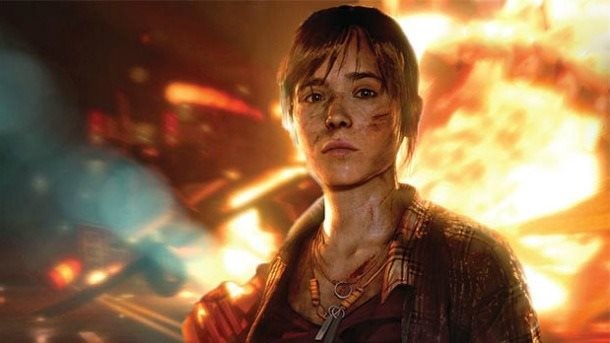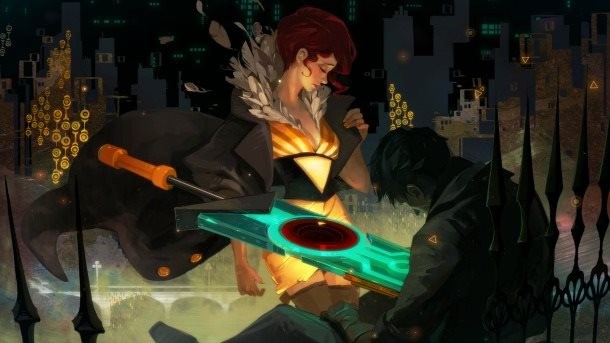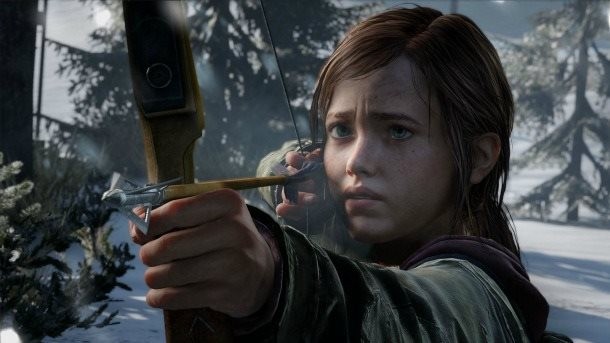Please support Game Informer. Print magazine subscriptions are less than $2 per issue
Opinion – We Need More Female Leads In Narrative Games

Jodie limped along the road, avoiding helicopter wrecks and surrounding debris. A nearby fire hydrant burst into a fountain of water, and flames erupted from the corner gas station. Dirt was smeared across her skin like a warrior's face paint, as she neared a dying officer on the ground. Grabbing him by the collar, she whispered menacingly, "Tell them to leave me alone, because next time, I'll kill everyone."
This kind of explosive action scene is usually led by a young, male lead. In Beyond: Two Souls, we follow the story of Jodie, the twenty-something girl with superhuman powers. She can crush buildings, fight cops atop a train, and hurl large objects on demand, similar to Infamous. A sense of awe and invincibility rushed through me as I watched the sequence unfold. It showcased a rare combination in triple-A games: a headstrong woman with supernatural abilities as a main character. I wasn't simply struck with how epic the scene was. Instead, I was left wondering, why can't there be more Jodies?
Female leads in narrative triple-A games are few and far between. Rockstar Games, one of the leading publishers in the industry, has never once had a female protagonist. Action-oriented sandbox franchises including Just Cause and Prototype, exclusively star superhero-like men. There have been iconic exceptions such as Lara Croft, but besides the obvious few, it often feels like I'm playing as another variant of Nathan Drake or Nico Bellic. In contrast, indie games have had a prolific amount of female protagonists, with successful titles like last year's Never Alone and Transistor. Why are triple-A games so far behind?

Nearly half of the current gaming population is female, making up 48 percent of the community across all genres and platforms. Additionally, a recent study highlighted at GDC revealed that in a survey of 1,583 high school students, 60 percent of girls preferred to play as their own gender, whereas only 39 percent of boys preferred playing as a male character.
Video game enthusiasts are becoming increasingly more levelled in terms of gender, and an older audience continues to grow. With these numbers, it might soon be considered more of a creative risk to not include women in games than to exclude them, in fear of alienating a core demographic in sales. Still, for that to happen, our attitudes toward the problem need to change.
Game studios are choosing to not create female characters, due to supposed technical issues with animation, or because of the widespread belief that female leads don't sell.
With video games exploring genres like sci-fi and action, a common misconception is that this type of media is only for men. However, with the rise of successful action movies like The Hunger Games being a huge success with women, and with Marvel tackling the all-female A-Force in their comics, it is evident that this ideology is changing. These genres can be enjoyed by both genders, and it is just a matter of time before they are marketed as such.
In recent years, games have adapted a wider use of character creation, giving players more freedom to shape their avatar's appearance and gender. But in narrative games, we are often forced to play as one gender, and it is almost always male, from Watch Dogs to Grand Theft Auto.
What if Alice Wake was searching for her lost husband? What if The Boss was a lead character in a new Metal Gear Solid game, as Hideo Kojima hinted he wanted to pursue years ago? Bioshock Infinite's Elizabeth and Ellie from The Last of Us were empowering women, and excelled as strong protagonists in DLC content. If I could play more video games as my own gender, it would only add to the immersion, not take away from it. The diversity could prove to be refreshing and rewarding for male players as well.

In narrative games, the main character is intertwined with the story: their decisions, perspective, and interactions can change not only who they are, but the people and environments around them. For example, in The Walking Dead, Clementine's innocence diminishes with every lethal strike she makes, shifting her away from the naïve, trustworthy child she once was.
Playing through a game as a woman could change not just how the games are played, but how that character responds to the game world. Would Jane Brody react to the Rook Islands with the same brute force as Jason did? If one of the three protagonists in Grand Theft Auto V was female, would she offer a different perspective on the world of Los Santos?
More women means more opportunities to explore engrossing stories and cultures. Narrative games with historical settings could profit from exploring women's rights in history. Imagine playing Red Dead Redemption as a female gunslinger in the Wild West - Rockstar could mold their character off of the real-life Belle Starr, a notorious American Outlaw from the 1800s.
Similarly, with Assassin's Creed's rich historical stories, the franchise could benefit from more female leads. While Assassin's Creed III: Liberation starred Aveline, its initial release was on handheld and is considered a smaller-scale title. Ubisoft could take this a step further by adding a female protagonist in their main line of successful console games. Assassin's Creed could explore Feudal Japan in the shoes of a character like Tomoe Gozen, the historical figure and female samurai warrior from the 1100s, who survived the Genpei War and saw the rise of a new empire.
Representing more social minorities in games gives the player more insight into unique perspectives. It offers a richer, more complex, and deeper storyline, and that can affect gameplay in a variety of ways.

Developing video games is a difficult and long process - it can take years to complete a game from start to finish. Games are becoming increasingly more expensive, with Bungie investing $500 million into the Destiny franchise. Risks are uncommon and franchises are milked more often than we see new IPs. Still, I don't think these hurdles should stop the industry from tackling new ideas and becoming more progressive.
In the end, the developer has the last word, and they shouldn't include women just to satisfy a social quota or feel like they have to justify their creative choices. They are free to pursue their vision and artistic direction, implementing characters and lifestyles they believe fit their game appropriately.
However, the industry is short-handed on women as programmers and developers. If a development team is entirely male, they may overlook the possibility of adding a female lead. Often, this isn't meant to be discriminatory. Most games are phenomenal as they are, with male leads shining in the spotlight. I just wonder, with games becoming more complex and advanced every year, wouldn't it be refreshing to share more of that spotlight with women?










